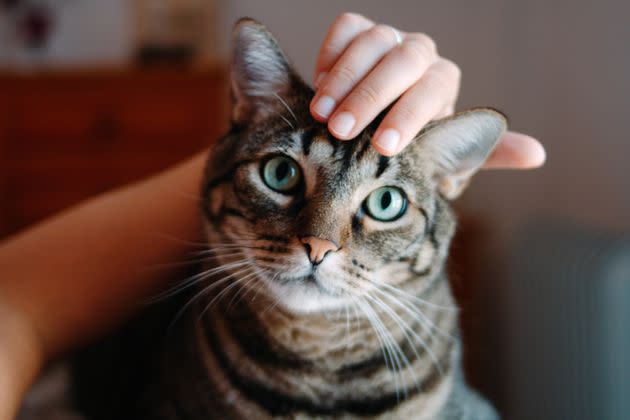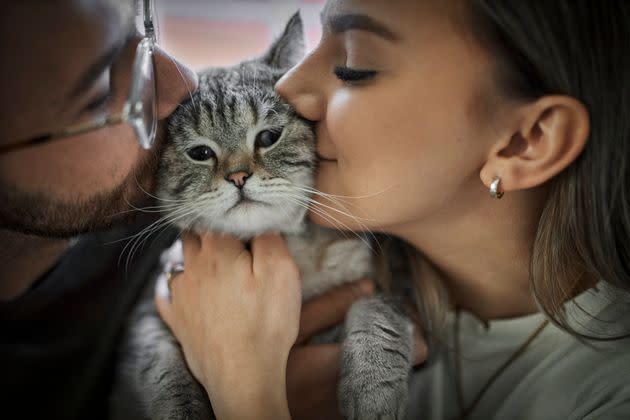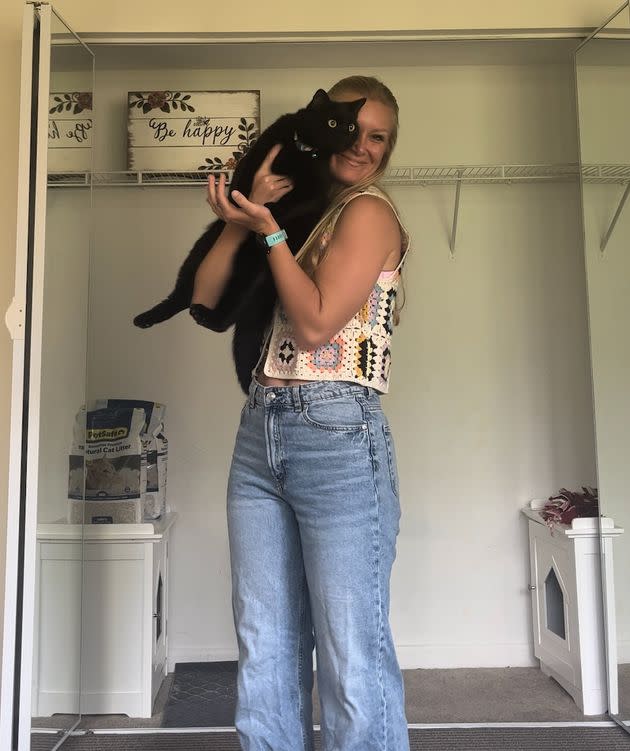Turns Out, Cats Like When You Use A 'Baby Voice'

Are you one of those people who uses a high-pitched baby voice to get your cat’s attention? Good news! They actually like that.
A study published in 2022 in the Animal Cognition found that cats can distinguish their owners’ voices from those of strangers, and that they respond positively to what we colloquially call baby talk, but only when it comes from their owner.
In the study, the researchers worked with 16 cats aged between 8 months and 2 years old. The scientists had the cats’ owners record phrases like “Do you want a treat?” in high-pitched “pet-directed speech” and in a tone they’d use with other adults. They also had 16 strangers record the same phrases using the same two styles of speaking.
The recordings were played for the cats in their own homes with their owner present but not interacting with them, according to New Scientist. The researchers then graded the intensity of the cats’ reactions ― things like dilated pupils, turning their ears or moving toward the voice ― on a scale from zero to 20.
They discovered cats were largely disinterested in the stranger’s voice, even when said stranger used a singsong-y baby talk voice. But when the cats’ owners employed a baby voice, 10 of the 16 cats perked up and paid attention.
“For a long time it has been thought that cats are very independent creatures, only interested in [humans for] eating and shelter, but the fact that they react specifically to their owner, and not just anybody addressing them, supports the idea that they are attached,” the lead researcher Charlotte de Mouzon told The Guardian.
“It brings further evidence to encourage humans to consider cats as sensitive and communicative individuals,” she said.

Mikel Delgado, a cat behavioral consultant at Feline Minds who’s unaffiliated with the study, told HuffPost she isn’t entirely surprised by this information.
“Many species ― dogs included, according to research ― seem to preferentially respond to a high-pitched ‘infant-directed speech’ style,” said Delgado, the author of “Play With Your Cat! The Essential Guide to Interactive Play for a Happier, Healthier Feline.”
“In general, my experience is that cats seem more comfortable with quieter, higher-pitched voices, and a less threatening or loud approach,” Delgado said. “My guess is that cats are much more used to listening to their human’s voice and know that when their owner’s voice switches from human-directed to cat-directed baby voice, that likely predicts good outcomes, such as treats, food, play or attention!”
Jessie Howkins said her 1-year-old cat, Marlin, only visibly listens when she speaks to him in baby voice: When he hears it, he’ll make eye contact and his tail shoots up.
“Whether this is my doing ― I cannot remember a time that I ever used my normal voice when speaking to him ― or whether he just naturally perks up with the baby voice is unknown to me,” Howkins told HuffPost.

Amira Spann, who runs the popular TikTok account BubbynMittens, says her two cats are surprisingly good at reading tone.
“Mittens and Bubby respond to the intonation of voice to know when they’ve done something wrong or if they are doing something right,” Spann said.
They both like when she uses a baby voice, but especially Bubby, who, in general, is a highly communicative kitty.
“He actually does a form of ‘hello’ when he’s looking for me, similar sounding to ‘HER ROH.’ It’s like he mimics the way I say hello,” Spann told HuffPost. “He also has been more vocal as his age progresses; I found that when he’s happy and trying to get everyone to gather around a toy or a piece of food he’s stolen, he makes the similar ‘hello’ sound.”
One other effective way to communicate and bond with your cat besides saying “hello” in a baby voice? Slow, concentrated blinking. A 2020 study found that slow-blinking at cats helps communicate positive feelings and puts a cat at ease.
So mounting research clearly shows that cats really are attached to their humans ― that attachment just hasn’t been studied as rigorously as it has with dogs, Delgado said.
“I think that’s because cats are generally considered harder to read and also harder for us to study scientifically,” she explained. (You can bring a dog into a science lab, but it’s trickier to get a cat in.)
Cats also have a much shorter domestication history compared to dogs, and we have done much less selective breeding for specific behaviors in cats compared to dogs.
“Many of the changes dogs have experienced during domestication were directly related to working with and communicating with humans,” Delgado said, “We’ve worked less with cats, so it’s not surprising that cats appear to be a little more mysterious.”
Well, meow you know more.

